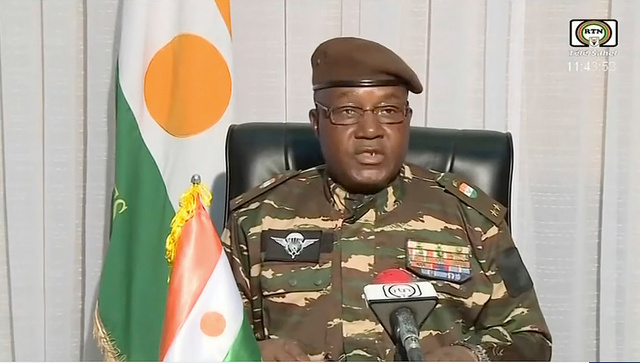General Abdourahmane Tchiani has named himself Niger’s new leader. Tchiani, who goes by ‘Omar’, on Friday took to state television to ask for support for the takeover days after the military detained Niger’s democratically-elected president Mohamed Bazoum. Tchiani was identified as the leader of the National Council for the Safeguarding of the Country – the group of soldiers who said they staged the coup. But who is Tchiani? What do we know about him? Let’s take a closer look: Tchiani is head of the presidential guard – which is drawn from the armed forces and usually protects the president and his entourage. As per Gilletnews.com, Tchiani hails from Niger’s Tillaberi. The western region is a major source of recruitment for the army. Tchiani has been leading the presidential guards since 2011.
He is said to be a close ally of ex-president Mahamadou Issoufou.
According to BBC, it was Issoufou who promoted Tchiani to the rank of general in 2018. Interestingly, Tchiani prevented an attempted coup in March 2021 – just prior to Bazoum taking power. Tchani was also linked to a 2015 attempted coup, but denied it in court. Bazoum was the first elected leader to succeed another since Niger’s independence in 1960, as per BBC. Why was the coup carried out? Tchiani’s motivations for the coup remain unclear. Paul Melly, Niger expert at the London-based think tank Chatham House, told Al Jazeera it is rumoured that Bazoum was considered replacing Tchiani prior to the coup – either due to his age (62) or unhappiness within the army particularly the presidential guard. It is also possible that Bazoum wanted to assert his own authority by replacing Tchiani or remaking the presidential guard, Melly added. [caption id=“attachment_12922162” align=“alignnone” width=“640”] Niger Army spokesman Colonel Major Amadou Adramane speaks during an appearance on national television, after President Mohamed Bazoum was held in the presidential palace, in Niamey, Niger, July 26, 2023 in this still image taken from video. ORTN/via Reuters TV/Handout via REUTERS THIS IMAGE HAS BEEN SUPPLIED BY A THIRD PARTY. NO RESALES. NO ARCHIVES. NIGER OUT. NO COMMERCIAL OR EDITORIAL SALES IN NIGER[/caption] Tchiani on state TV said Niger needed to change course to avoid “the gradual and inevitable demise” and thus he and others had decided to intervene. Tchiani reiterated that soldiers had seized power due to the worsening security. He also criticized the lack of “genuine collaboration” with military governments in Mali and Burkina Faso in the fight against insurgencies. “The harsh reality of insecurity in Niger, experienced by our defence forces and hardworking populations, with its toll of deaths, displacement, humiliation, and frustration, reminds us on a daily basis of this stark reality,” Tchiani said. “What sense lies in the security approach against terrorism that excludes any genuine collaboration with Burkina Faso and Mali, even though we share the Liptako-Gourma zone, where most of the terrorist group activities we are fighting against are concentrated,” he added. Tchiani said the National Council for the Safeguarding of the Homeland, over which he is now presiding, will respect all commitments made to the international community. “I also ask the technical and financial partners and friends of Niger to understand the specific situation of our country and provide all necessary support to help it overcome the challenges it faces,” he added. Earlier, various factions of Niger’s military wrangled for power, according to an analyst and a Western military official.
Tchiani’s appearance seemed to be an effort to show he was in charge, though the situation was still in flux.
Niger’s coup is the seventh in West and Central Africa since 2020 and could have grave consequences for democratic progress and the fight against an insurgency by jihadist militants in the region, where Niger is a key Western ally. France, the country’s former colonial power, and the West African regional bloc ECOWAS called for Bazoum’s immediate release and a return to constitutional order. Russian Foreign Minister Sergei Lavrov also said that constitutional order should be restored. US vice-president Kamala Harris said cooperation with Niger’s government was contingent on its “continued commitment to democratic standards”. The US also supports taking action at the United Nations Security Council to de-escalate the situation in Niger, a spokesperson for the US UN mission said. African Union Commission Chair Moussa Faki Mahamat said he had spoken on Thursday with Bazoum and that the president was “fine”, Russian news agency RIA reported. With inputs from agencies


)

)
)
)
)
)
)
)
)



